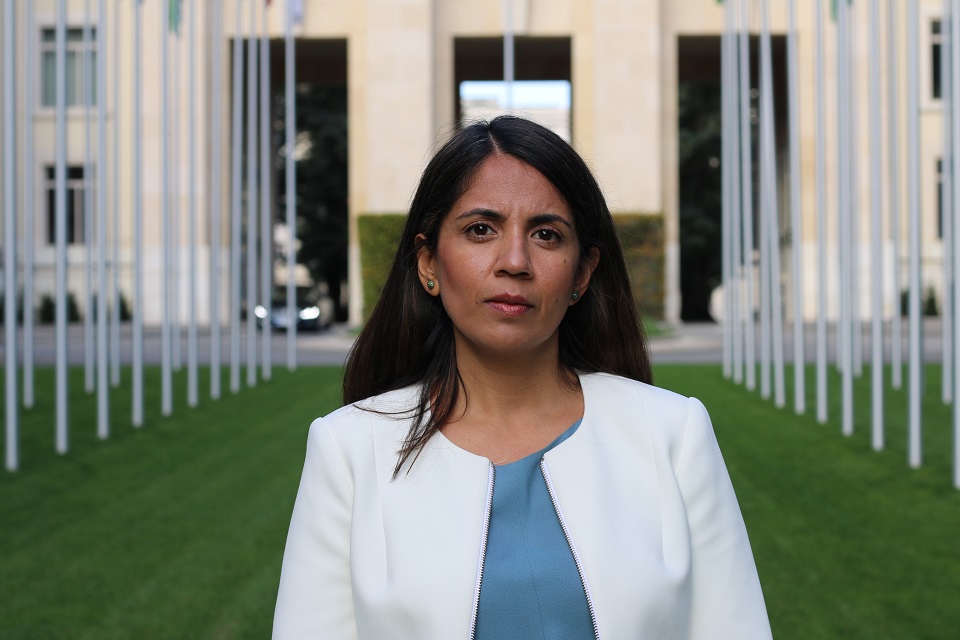UK statement for 74th session of the UNHCR Executive Committee
This statement was delivered by the UK Human Rights Ambassador Rita French at the 74th UNHCR Executive Committee.

Thank you Chair, High Commissioner, and distinguished delegates.
The UK expresses its deepest sympathies to those killed by the earthquakes in Afghanistan and the terrorist acts in Israel. We express our steadfast support to the State of Israel, and our unequivocal condemnation of Hamas and its appalling acts of terrorism.
As you recognised, High Commissioner, the conflict in the Middle East is a ‘dangerous piece in a growing mosaic of crises,’ alongside rising forced displacement – now at over 110 million people.
In recognition of these rising urgent humanitarian needs, in 2024-2025, the UK intends to spend £1 billion globally. We have also sustained our core, unearmarked funding in 2023 and encourage others to likewise provide flexible contributions.
High Commissioner, I would like to express our deep gratitude to UNHCR staff for your invaluable work and we applaud UNHCR’s ongoing Business Transformation efforts to make the organisation more effective and efficient.
I want to recognise the continued generosity and leadership of host nations and communities for providing sanctuary to forcibly displaced people.
We are gravely concerned about displacement globally, including the continued crisis in Sudan which has displaced 1.1 million people, with more affected by the day. The continued widespread violence across the country and significant civilian death toll are horrific. The Sudanese Armed Forces (SAF) and Rapid Support Forces (RSF) have dragged Sudan into a wholly unjustified war, with utter disregard for the Sudanese people, and they will be held accountable.
Chad, Egypt and South Sudan have led the way in providing protection to those fleeing violence. But the impact on these generous host nations – all of whom are facing their own humanitarian or economic challenges – is immense.
In addition to £21.7 million for humanitarian assistance inside Sudan, we have committed £5 million to help meet the urgent needs of refugees and returnees in South Sudan and Chad.
We will tirelessly pursue all diplomatic avenues to press for a permanent ceasefire, allow unfettered humanitarian access, and commit to a sustained and meaningful peace process.
Russia’s invasion of Ukraine has also displaced around 11 million people and leaves nearly 18 million in humanitarian need.
In response, we have provided £347 million in humanitarian assistance since the start of the invasion and, as of 25 September, there have been 186,600 arrivals of Ukrainian refugees to the UK.
To reiterate our Foreign Secretary’s clear message, we remain steadfast in our commitment to support Ukraine to recover its territory and ‘win the peace’.
These are just two examples, but we are committed to using all our diplomatic, development and humanitarian levers to support all forcibly displaced people and peacebuilding globally. We will renew our commitment to doing so in our Development White Paper later this year.
The UK remains committed to the Global Compact on Refugees as the best strategy to achieve greater burden- and responsibility-sharing. We recognise the fundamental part the Compact plays in ensuring the international protection regime is fit for the 21st century, including supporting inclusion and protection of the most vulnerable, including women and girls, the LGBT+ community and those with disabilities.
Therefore, the UK aligns itself with the statement of Group of Friends on the Charter on Disability Inclusion.
The Global Refugee Forum is an opportunity for the international community to recommit to the Global Compact. And we look forward to announcing our pledges at the Forum in December.
UNHCR estimates there are 10 million stateless people worldwide with the Rohingya the single largest stateless population of two million and increasing, and the UK aligns itself with the statement of the Group of Friends on Statelessness.
Over the past six years, the UK has provided £365 million to the response in Bangladesh and nearly £30 million to Rohingya and other Muslim minorities in Rakhine State.
But the situation remains desperate.
The long-term solution for this crisis must be the safe, voluntary, and dignified return of the Rohingya to Rakhine state, once the conditions allow.
We remain committed to making this a reality, and to supporting Rohingya refugees across the region until they can return home.
High Commissioner, the UK Minister for the region is pleased to be co-convening the Rohingya Conference in Bangkok next week alongside UNHCR.
On the International Day of the Girl, I want to highlight that statelessness is a gender equality issue.
There are 24 countries that do not allow women to pass on their citizenship on an equal basis to men. These laws are a root cause of childhood and multi-generational statelessness. We call on these countries to reform their nationality laws.
Statelessness can be ended. And we look forward to joining the Global Alliance to End Statelessness when it is launched in 2024 to help make this happen.
Thank you very much.